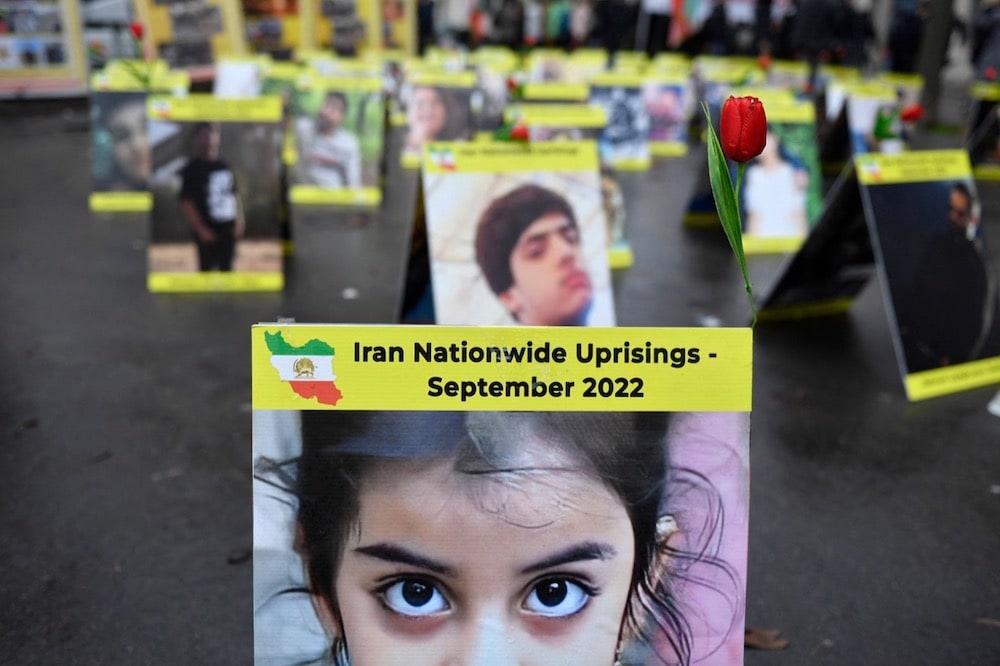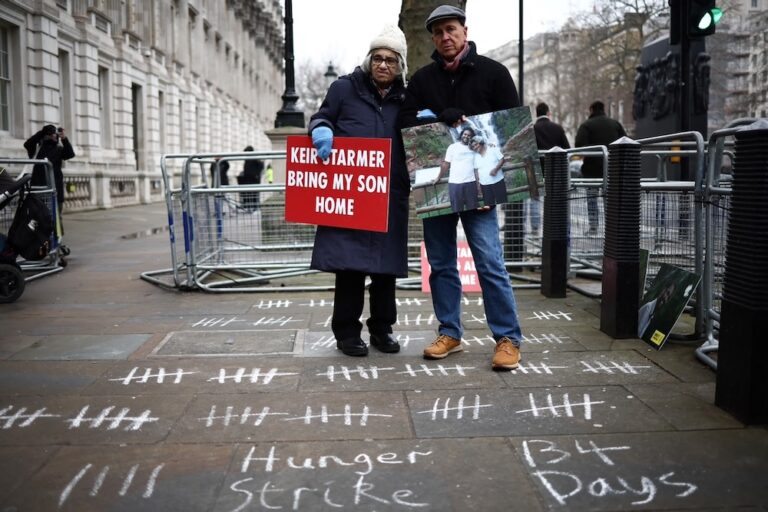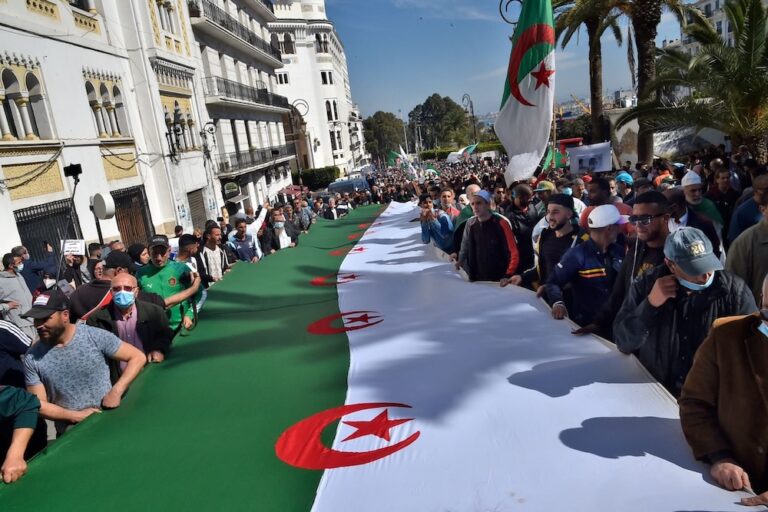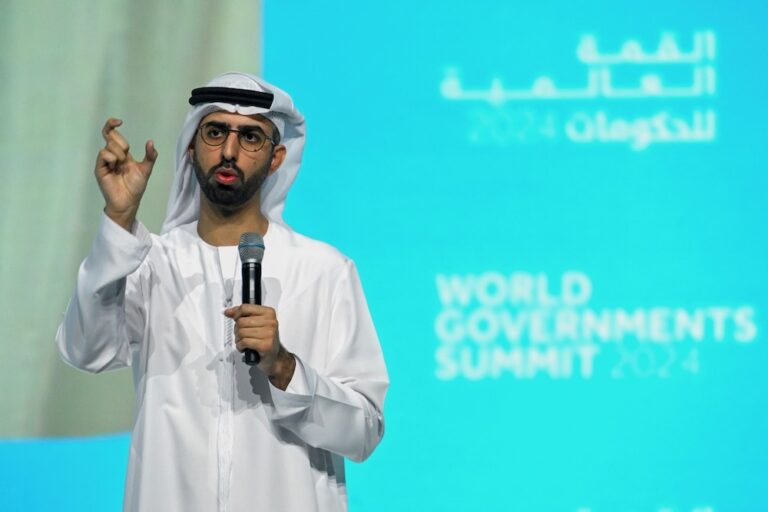November 2022 in Middle East and North Africa: A free expression roundup produced by IFEX's Regional Editor Naseem Tarawnah, based on IFEX member reports and news from the region.
Detained protesters at risk of death penalty in Iran. Double-standards for free expression at Qatar’s World Cup. MBS immunity for Jamal Khashoggi’s murder. FBI investigates Shireen Abu Akleh’s case.
Iran: Misinformation and death penalties
On 24 November, the UN Human Rights Council voted to adopt a landmark resolution establishing an international, independent fact-finding mission mandated with investigating human rights violations committed against Iranian protesters. “This significant move towards accountability offers renewed hope to victims of the authorities’ bloody crackdown on protests,” said ARTICLE 19’s executive director, Quinn McKew.
Recent weeks have seen anti-government protesters continue to be targeted by security forces, with hundreds reported dead and thousands injured. Given the lack of transparency by Iranian authorities, accurate figures have been hard to come by, which reinforces the urgent need for an independent investigation.
In a restricted media environment, misinformation has been abundant. A misreported claim that Iran had imposed the death penalty on 15,000 detained protesters spread on social media earlier last month, with even Canadian Prime Minister Justin Trudeau and several celebrities briefly sharing it before journalists pointed out the inaccuracy.
The claim originated from a since-corrected Newsweek article reporting on a statement issued by 227 parliamentarians calling on the country’s judiciary to punish people engaging in “moharabeh” — that is, “waging battle against God.” It is a charge typically levied against protesters that, along with “spreading corruption on Earth”, can include a death sentence. In the wake of widespread criticism, a news agency affiliated with Iran’s parliament claimed the letter was “basically fake”.
Weeks later, news of Iran supposedly disbanding its notorious “morality police” was another case of unverified reporting gone awry. Misreported by western media outlets, the claim centered on a vague statement made by Iranian Attorney General Mohammad Jafar Montazeri during a press conference. When asked why the policing unit tasked with enforcing the country’s dress code had not been seen on the streets recently, Montazeri responded by pointing out that the morality police do not fall under the purview of the judiciary system, adding vaguely: “the same source that created it in the past – from that same source it has been shut down.”
Through the haze of misinformation, the stark reality of brutal state repression persists. Thousands of protesters have been arrested since September, including more than 70 journalists, according to a tally by the Committee to Protect Journalists (CPJ).
At least 22 people are reportedly at risk of the death sentence, facing trials on charges of “moharabeh” and “corruption on Earth”. This includes artists like dissident rapper Toomaj Salehi. Toomaj was arrested in October shortly after giving an interview with CBC News where he discussed the crackdown and targeting of artists, saying: “You are dealing with a mafia that is ready to kill the entire nation… in order to keep its power, money and weapons.”
“The Iranian government is putting writers’ lives at severe risk through its brazen violation of basic human rights that include systematic abuse and torture in custody, coupled with fast-tracked and harsh sentences solely for exercising the right to free expression,” said Karin Deutsch Karlekar, PEN America’s director of Free Expression at Risk Programs, in a statement.
With so many behind bars for their free expression, Iran’s execution of Mohsen Shejari, one of 11 protesters believed to have received a death sentence, raised alarms amongst the rights community that more executions would follow as the regime seeks to silence demonstrators.
Also underscoring the severity of the crackdown, the lethal targeting of women protesters and activists in Iran has been particularly concerning. Last month, Iranian Arab civil rights activist Atefeh Nea’ami was found dead in her apartment, in what her family say was a ‘staged’ suicide.
Qatar’s World Cup: A politicized arena for free expression
As football fans and critics debated the double-standards of criticism lodged against Qatar’s human rights record, the region’s first World Cup unfolded against a politically-charged backdrop.
Rising tensions in Israeli-Palestinian violence saw a plethora of Palestinian flags flown during matches in an expression of solidarity, while Israeli media were noticeably shunned by fans. While airing pro-Palestinian sentiments has been permitted, security forces clamped down on fans seeking to express support for anti-government protesters in Iran.
With ongoing nationwide protests at home, Iran’s national team walked a political ‘tightrope’, with reports of players’ families being threatened if they failed to “behave” ahead of a match against the US. In an expression of solidarity with demonstrators, Iranian players refused to sing the country’s national anthem during an earlier match with England, and were reportedly closely monitored by Iranian security agencies operating in Qatar during the event. Concerns have also been raised over the team’s safety upon returning home after their World Cup exit.
Journalists attempted to tackle the underlying human rights issues in Qatar, as well as FIFA’s responsibility for migrant deaths during the construction of the global event. During an interview, Qatar’s World Cup chief said roughly 400-500 workers, mostly from South Asian nations, died while building the country’s infrastructure ahead of the games, a figure contested by rights groups that believe the number to be much higher, and that have pressed authorities to compensate the victims’ families.
Immunity for Khashoggi’s murder; FBI investigating Abu Akleh’s killing
Rights groups condemned a decision by US President Biden’s administration to grant Saudi Crown Prince Mohammed bin Salman (MBS) sovereign immunity from prosecution in a civil case over his role in the horrific killing of journalist Jamal Khashoggi.
The US State Department submitted a statement to a US district court in a civil lawsuit lodged against MBS and 20 others alleged to be involved in the killing, stating that it “recognizes and allows the immunity of Prime Minister Mohammed bin Salman as a sitting head of government of a foreign state.”
MBS was appointed Prime Minister in September, days before a deadline for the State Department to provide a response to a US district court inquiry regarding potential immunity in the 2020 civil case brought by Khashoggi’s fiancée, Hatice Cengiz, and civil rights group Democracy for the Arab World Now (DAWN).
“The Biden administration’s submission that Saudi Crown Prince Mohammed bin Salman qualifies for immunity from prosecution is a shameful climb down from any semblance of justice for journalist Jamal Khashoggi,” said CPJ Middle East and North Africa Program Coordinator Sherif Mansour. “The U.S. government should not throw a wrench in the workings of justice by trying to prevent this case moving forward.”
The case was later dismissed by the presiding judge who said he had no choice but to throw out the lawsuit, citing the Biden administration’s suggestion of immunity.
Meanwhile, the US Department of Justice announced an FBI investigation into the May 11 killing of Palestinian American journalist Shireen Abu Akleh, in what CPJ called “an important first step toward potentially achieving justice in her case.” The announcement comes after months of mounting advocacy led by the slain journalist’s family. The Israeli government declared that it would not cooperate with the investigation, calling it “interference in Israel’s internal affairs”.
In further pursuit of justice, the Al-Jazeera Network for whom the prominent journalist worked submitted a formal request to the International Criminal Court (ICC) to investigate and prosecute those responsible for her killing.
Climate summit in Egypt’s surveillance state
November’s UN Climate Change Conference (COP27) in Egypt was dominated by human rights issues. Taking place in a severely restricted civic space for expression and civil society participation, authorities detained hundreds of Egyptians, including journalists, ahead of the global climate conference, in a crackdown following calls for protests.
Even attendees felt the presence of Egypt’s surveillance state, with reports that the conference’s internet connection blocked websites of global rights organizations like Human Rights Watch. While some summit attendees were advised by security advisers not to download the official smartphone app of the Egyptian government out of concern that it could be used to hack their personal emails, texts, and voice conversations, the UN announced it would look into claims made by Germany that participants were being monitored by Egyptian authorities.
Imprisoned writer and activist Alaa Abd El Fattah’s decision to go on a full hunger strike, refusing even water, drew international attention to Egypt’s human rights record amidst growing concerns over his life. El-Fattah’s sister, activist Sanaa Seif, hosted a press conference at COP27, managing to draw the largest gathering of journalists seen at the event. The British-Egyptian activist eventually ended his hunger strike, but not before helping ignite a global examination of the country’s rights record, specifically its thousands of political prisoners.
European Parliament members called on governments in Europe to intervene for Abd El Fattah’s immediate release, and demand his transport outside the country, due to his declining health and the possibility of his re-arrest. Egyptian rights groups also welcomed the parliament’s adoption of a resolution calling for tougher EU measures to address Egypt’s human rights crisis.
Journalist Ahmed Fayez was arrested for a Facebook post in which he claimed that Abd El Fattah was being force-fed by prison authorities in an effort to keep him alive during his prolonged hunger strike.
In Brief
Iraq: In a new report, HRW said the Iraqi government under former Prime Minister Mustafa al-Kadhimi failed to deliver on promises to hold accountable state security personnel and state-backed armed groups behind the killing, maiming, and disappearance of hundreds of demonstrators and activists since 2019.
Hundreds of demonstrators were killed during protests in southern and central Iraq that began in October 2019, with al-Kadhimi establishing a fact-finding commission that has yet to release any substantial information about its findings, or even disclose the cases it examined. According to HRW, despite victims and the families of those killed or disappeared filing legal complaints, authorities failed to follow up, with some cases reportedly being simply “put to sleep”.
Days after Prime Minister Mohammed Shia al-Sudani was appointed in October, the government announced an investigation into the “theft” of $2.5 billion embezzled from the country’s tax authorities. On 27 November, al-Sudani announced that roughly $125 million of the stolen funds had been recovered within two weeks of investigations by a special commission. Meanwhile, investigations into protester deaths have not seen the same urgency.
Bahrain: Prominent human rights defender Abdulhadi Al-Khawaja faced new charges last month in connection to his protests in prison. The charges included insulting a public servant and Bahrain’s normalisation with Israel, in addition to breaking a plastic chair after being denied the right to call his daughters. Despite already serving a life sentence, Al Khawaja was subsequently convicted and fined following a trial where he was neither present, and was denied legal representation to challenge the case.
New & Noteworthy
Bread&Net, Five Years On: Over 800 participants came together last month for Bread&Net to address the most threatening challenges restricting rights and freedoms in the digital sphere. Marking its fifth year, the regional digital rights conference hosted by IFEX member Social Media Exchange (SMEX) delved into a variety of critical issues, and explored opportunities for collaborative advocacy and solidarity within the Arabic-speaking digital rights community.
Finally, in Palestine, gender-based violence has seen a dramatic increase in the Palestinian digital space over the last several years, according to a new report from The Arab Center for the Advancement of Social Media (7amleh).



